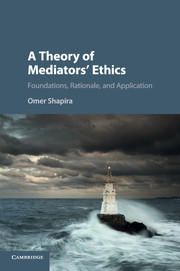Book contents
- Frontmatter
- Dedication
- Contents
- List of figures
- List of tables
- Preface
- Abbreviations of codes of conduct
- PART I A theory of professional ethics
- PART II A theory of mediators’ ethics
- 3 Mediation, mediators’ role, and mediators’ ethics
- 4 Party self-determination
- 5 Mediator competence
- 6 Conflicts of interest
- 7 Mediator impartiality
- 8 Professional integrity
- 9 Diligence, respect and dignity, and honesty
- 10 Confidentiality
- 11 Fairness
- 12 Maintaining the profession's standing and advancement of the profession
- 13 Advertising, solicitation, and mediator fees
- 14 Obligations to employers and principals
- PART III Dealing with ethical problems
- Appendix I A proposed model code of conduct for mediators
- Appendix II Model standards of conduct for mediators (2005)
- Bibliography
- Index
10 - Confidentiality
from PART II - A theory of mediators’ ethics
Published online by Cambridge University Press: 05 March 2016
- Frontmatter
- Dedication
- Contents
- List of figures
- List of tables
- Preface
- Abbreviations of codes of conduct
- PART I A theory of professional ethics
- PART II A theory of mediators’ ethics
- 3 Mediation, mediators’ role, and mediators’ ethics
- 4 Party self-determination
- 5 Mediator competence
- 6 Conflicts of interest
- 7 Mediator impartiality
- 8 Professional integrity
- 9 Diligence, respect and dignity, and honesty
- 10 Confidentiality
- 11 Fairness
- 12 Maintaining the profession's standing and advancement of the profession
- 13 Advertising, solicitation, and mediator fees
- 14 Obligations to employers and principals
- PART III Dealing with ethical problems
- Appendix I A proposed model code of conduct for mediators
- Appendix II Model standards of conduct for mediators (2005)
- Bibliography
- Index
Summary
Introduction
The confidentiality aspects of mediation are extensively discussed in the mediation literature. Mediation confidentiality has been the subject of dozens of articles, and many textbooks on mediation devote a chapter to confidentiality matters that arise in mediation practice. The discussion, however, primarily focuses on the legal aspects of confidentiality. Scholars describe, interpret, and criticize the scope of mediation confidentiality in statutes, case-law, and codes of conduct for mediators. In contrast, this chapter concentrates on the ethical duty of mediators to maintain the confidentiality of the mediation process, addressing some of the legal aspects of the duty when they affect its ethical scope. The chapter employs the perspective of professional ethics to determine the extent of mediators’ obligation of confidentiality, and the grounds for justified disclosure of information obtained in the exercise of their role.
Expectations of confidentiality
The parties’ expectations of mediator confidentiality
Mediation parties contact mediators for their services. They are clients receiving a professional service, and as such they are entitled to expect that information about them or their case, to which the mediator is exposed in the provision of mediation services, is kept in confidence by the mediator and not disclosed to anyone without their permission. The parties’ expectations are based on several grounds: first, on the relationship of trust that exists between the parties and the mediator. Professor Kovach, for example, correctly commented that “[t]rust is an element of mediation closely related to confidentiality”; and the New York State Community Dispute Resolution Center Mediator Ethics Advisory Committee (MEAC) observed that “[c]onfidentiality is integral to the mediation process. It fosters trust among the parties and between each party and the mediator, and it also promotes trust among parties in the mediation process itself.” My argument is that mediators must maintain confidentiality in the exercise of their role in order to be worthy of the parties’ trust; second, the parties’ expectations of confidentiality rest on a promise of the mediator to keep in confidence the information to which he is exposed in the course of exercising his role.
- Type
- Chapter
- Information
- A Theory of Mediators' EthicsFoundations, Rationale, and Application, pp. 271 - 301Publisher: Cambridge University PressPrint publication year: 2016



